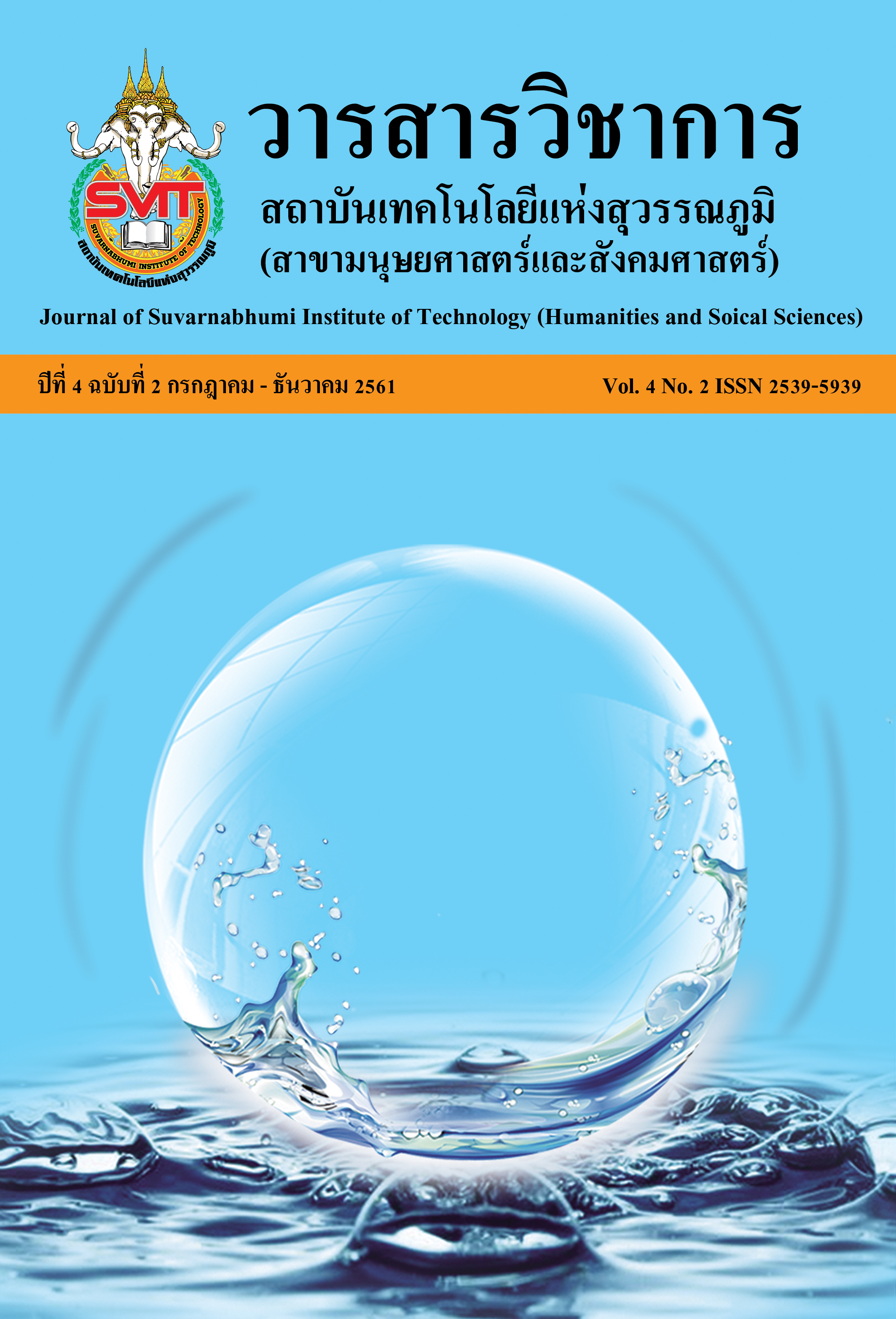GUIDELINES FOR INTEGRATED AGRO-TOURISM MARKETING DEVELOPMENT AND SUPPLY CHAIN WITH NAN LIFESTYLE
Keywords:
Agro-tourism Marketing Development, Integrate, Nan lifestyle, Supply ChainAbstract
This research was funded by the Office of the Higher Education Commission in fiscal year 2016. Conducting research under the master plan for Guideline for integrated Agro-tourism development on Nan style. This qualitative research is related to Agro-Tourism situation through Nan lifestyle and Potential study and Nan’s Agro-Tourism development plan. The objectives are to study the present situation of marketing strategy and supply chain of agro-tourism, study of marketing capabilities and supply chain of agro-tourism and suggest guidelines for Integrated Agro-tourism Marketing Development and Supply Chain with Nan Lifestyle. Research by in-depth interview were conducted by 25 agro-tourism entrepreneurs, focus group discussion and workshop training with 45 agro-tourism entrepreneurs and In-depth interviews with 18 tourism specialist.
The outcomes of research revealed that Nan is unique and has attracted the attention of tourists. It has potential and is suitable for Agro-tourism. Prospects of Agro-tourism destinations of the important district of Nan are 1) Ban Maneepruck 2) Huanam homestay and mushroom farm 3) Farm Fame Fai and 4) Ban Donmool. In these areas, the farmers have potential to carry out Agro-tourism activities, but they lack of tourism knowledge and management skills for Agro-tourism. The guidelines for Integrated Agro Tourism Marketing Development and Supply Chain with Nan Lifestyle will be mentioned as the concept of Positioning of Nan’s Agro-Tourism as a selling point for attract the attention of tourists. The format and cost of tourism are involved with 3 programs; lower-price travel, normal price and price in travelling season. Channels to reach to the tourist are Social Media, Web site, Hotline, Nan Cultural Exhibition Hall and Tourist Agency. Marketing promotion activities will focus on preserving the image of the province during the important festivals, Car service, Tours by bicycle to enhance the travel experience, Photo corner, Design of tourist service design, Special events etc. Integrated marketing communications are tools to drive all activities.
References
ราณี อิสิชัยกุล และ วรรณำ ศิลปอาชา (2558) การศึกษาศักยภาพและแนวทางการพัฒนาตลาดการท่องเที่ยวชุมชนในประเทศไทยและกลุ่มประเทศอาเซียน. โครงการวิจัย. มหาวิทยาลัยสุโขทัยธรรมาธิราช. กรุงเทพฯ.
ศรีสมรัก อินทุจันทร์ยง และคณะ (2557) การศึกษำโซ่อุปทานและตัวแบบข้อมูลในอุตสาหกรรมกำรท่องเที่ยวของประเทศไทย. วารสารสุทธิปริทัศน์, 28(85), 352- 369.
ศศิธร เจตานนท์ และ เบญจพร แย้มจ่าเมือง. (2556). กลยุทธ์การวางแผนการตลาดเพื่อส่งเสริมการท่องเที่ยวเชิงเกษตรสำหรับครอบครัว กรณีศึกษาชุมชนบางน้ำผึ้ง อำเภอพระประแดง จังหวัดสมุทรปราการ. โครงกำรวิจัย. มหาวิทยาลัยราชภัฏสวนสุนันทา. กรุงเทพฯ.
สำนักงานสถิติจังหวัดน่าน. (2559). แผนพัฒนาจังหวัดน่าน 4 ปี (พ.ศ.2558 – 2561) : รายงานสถิตจังหวัดน่ำน. สำนักงานจังหวัดน่าน
March, R., and Wilkinson, I. (2009). Conceptual tools for evaluating tourism partnerships. Tourism Management 30, p. 455-462.
Paresh V. Joshi and Milind B. Bhujbal. (2012). Agro-Tourism A Specialized Rural Tourism: Innovative Product of Rural Market. International Journal of Business and Management Tomorrow.pg 1-12.
Piboonrungroj, P. and Disney, S.M. (2009). Tourism Supply Chains: A Conceptual Framework, Exploring Tourism III: Issue in PhD Research. In: Proceeding of the PhD Networking Conference, July 2009. Christel De Haan Tourism and Travel Research Institute.
Tapper, R. and Font, X. (2004).Tourism supply chains. Report of a desk research project for the travel foundation. p. 23.Leeds Metropolitan University
Zhang, Y. and Murphy, P. (2009). Supply-chain considerations in marketing underdeveloped regional destinations: A case study of Chinese to Goldfields region of Victoria. Tourism Management, 30(2), p. 278-287
Downloads
Published
Issue
Section
License
The articles published are copyrighted by the Sarasas Journal of Humanities and Social Science. The opinions expressed in each article in this academic journal are those of the individual authors and do not reflect the views of Sarasas Suvarnabhumi Institute of Technology. The authors are solely responsible for all aspects of their respective articles. Any errors or inaccuracies in the articles are the sole responsibility of the authors.



